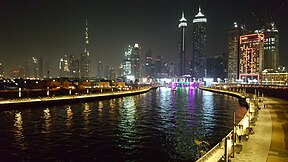Dubai Canal is an artificial water canal unveiled on 2 October 2013 and inaugurated on 9 November 2016. The canal sidewalk comprises one shopping centre, four hotels, 450 restaurants, luxury housing, walkways and cycle paths. It is a 3.2 km (2.0 mi) long project starting from Business Bay into the Arabian Gulf through Safa Park and Jumeirah west of the Indian Ocean. The width ranges from 80 m (260 ft) to 120 m (390 ft). It is 6 m (20 ft) feet deep and be crossed by 8 m (26 ft) high bridges. It creates new public places and facilities with a total area of 80,000 m2 (860,000 sq ft) with private marinas for boats and a trade centre at the entrance of the canal.[1] Te development was designed by AE7 Architects and Planners.
| Dubai Canal | |
|---|---|
 Dubai Canal – a night view | |
| Specifications | |
| Length | 3.2 km (2.0 mi) |
| Maximum boat length | 32 m (105 ft) |
| History | |
| Construction began | 2013 |
| Date completed | 2016 |
| Geography | |
| Beginning coordinates | 25°12′12″N 55°19′38″E / 25.2033°N 55.3271°E |
| Ending coordinates | 25°11′47″N 55°14′00″E / 25.1963°N 55.2332°E |
Built by BESIX Group subsidiary Six Construct,[2] the canal is crossed by 3 pedestrian/bicycle bridges, including the Dubai Water Canal Bridge, better known as the Twisted Bridge and now renamed Bridge of Tolerance, so named by His Highness Shaikh Mohammad Bin Rashid Al Maktoum, Vice-President and Prime Minister of the UAE and Ruler of Dubai on November 15, 2017.[3]
Infrastructure
editRoads and Transport Authority (RTA) built bridges over the canal for Sheikh Zayed Road, Al Wasl Road and Jumeirah Road. The Sheikh Zayed road bridge has eight lanes in each direction and three lanes in each direction on Al Wasl Road and Jumeirah Road. The crossings are 8.5 meters above the water to allow boats to pass underneath.[4]Dubai Water Canal was built by dredging the canal bed up to six metres and removing more than 3.2 million cubic metres of soil. Around 15,000 concrete blocks were used to build and fortify the banks – each weighing 40 tons.[5] It has taken over the areas of Dubai like Al Satwa, Downtown, Zabeel, Oud Metha, Karama and Bur Dubai into one huge island which has become completely water locked.[6]
The project also includes three pedestrian crossings in addition to footpaths on all three new bridges and four marina stations for public transport.[4]
As of July 2014, the earthworks for the project near Sheikh Zayed Road had commenced.[7]
It was unveiled on 2 October 2013 and inaugurated on 9 November 2016. The canal and its bridges were built between 2014 and 2016 by BESIX subsidiary Six Construct.[8]
One of the first projects launched on Dubai Water Canal is Marasi Business Bay, which broke ground in June 2017.[9]
References
edit- ^ Churchill, Neil (3 October 2013). "Dubai Unveils Dhs2bn Canal Project For Business Bay". Gulf Business. Archived from the original on 19 February 2014. Retrieved 16 February 2014.
- ^ "Besix completes Dubai Water Canal work". Trade Arabia. November 13, 2016.
- ^ "Dubai Mohammad Bin Rashid: Tolerance is synonymous with UAE". Gulf News. Retrieved 15 November 2015.
- ^ a b Davids, Gavin. "RTA to divide $544.5mn Dubai Canal project into three contracts". Big Project. Archived from the original on 8 March 2014. Retrieved 3 March 2014.
- ^ "Dubai Water Canal | Activities and Information | Visit Dubai". www.visitdubai.com. Retrieved 2024-09-11.
- ^ "The Dubai Water Canal: A proud moment for all". gulfnews.com. 2016-11-15. Retrieved 2024-09-27.
- ^ "Work begins on Sheikh Zayed Road diversion as part of Dubai Canal project". The National. UAE. 21 July 2014. Retrieved 2 May 2021.
- ^ "Six Construct completes Dubai Water Canal works". Construction Week.
- ^ Fahy, Michael (25 January 2017). "'Floating homes' to be built in phase one of Marasi Business Bay in Dubai". The National. UAE. Retrieved 2 May 2021.